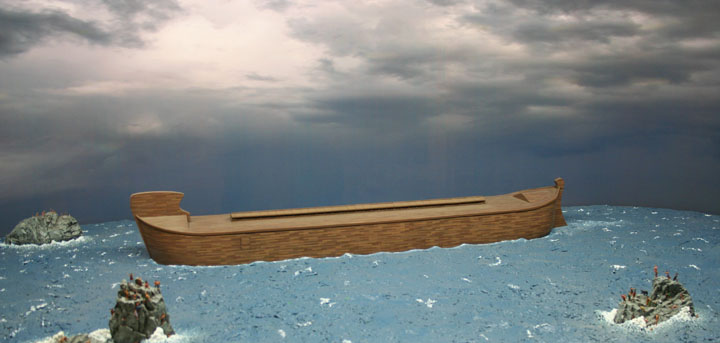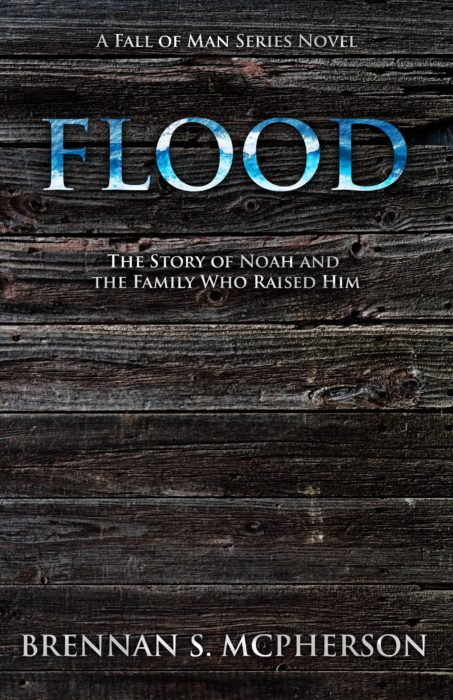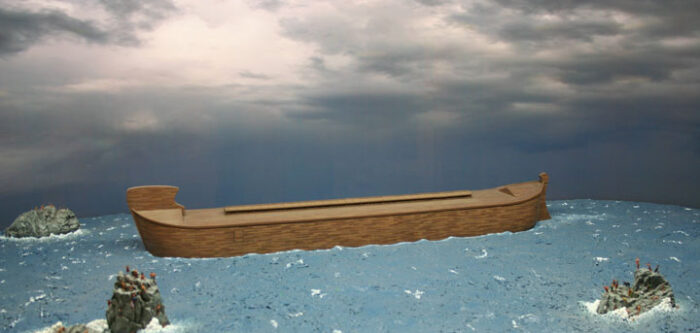Why Are People So Fascinated by the Flood?
All around the world, for thousands of years, people have woven tales about worldwide catastrophic floods. From those tales have erupted countless other spin-off stories shared by campfire or candle flame.
The Sumerians wrote of a worldwide flood in their creation myth. In the later Akkadian version of the same myth, Enki, the god of waters, warned Utnapishtim of the flood and gave instructions for building an ark.
Then you have the Islamic view of Noah, the Ancient Greek flood myths, an Irish flood myth, Welsh flood myths, a Norse flood myth, Chinese, Indian, African, Korean, Malaysian, Pilipino, Mesoamerican, South American, and North American flood myths.
It just keeps going.

Diorama at the Creation Museum near Cincinnati, Ky. (photographer: E. Stephen Burnett)
Many modern Christian organizations have sprung up around the belief that the Bible’s antediluvian stories (stories before the worldwide flood reported in Genesis 6) are real, and should impact our interpretation of geological and scientific studies, such as Answers in Genesis, or the Institute for Christian Research.
These organizations employ real scientists with real degrees who really believe that a real flood really took place. That means there’s definite scientific evidence to bolster the belief.
But the sheer number of flood myths and their common themes is staggering enough. John D. Morris, Ph.D., wrote an article for the Institute for Christian Research compiling his research of over 200 flood myths from around the world.
88% of them had a favored family. 95% of them had a global flood. 70% of them showed the favored family surviving because of a boat. 57% of the stories explicitly mention the survivors landing on a mountain. And get this, 7 percent of those stories mention a rainbow.
I know 7% doesn’t seem like a big number, but that’s at least 14 global flood stories worldwide that mention a rainbow. That’s unbelievable.1
But flood myths get at something deeper than just our view of historic reality. The fact that so many people over so many thousands of years have continued telling them to friends and family gives us a fascinating glimpse into human nature.
One might claim that what makes flood myths so interesting is the high level of interest that worldwide destruction of any kind carries. I can certainly see that the sheer scale and uniqueness of such an event make stories of global catastrophe interesting.
But if that’s the case, why don’t we have worldwide myths about the world being nearly destroyed by earthquakes? Or any other kind of natural disaster?
 I think the most powerful element that gives flood myths staying power—even more so than the intrigue factor of worldwide destruction, or the historical accuracy of such an event—is that flood myths are always about the connection between human beings and divine forces.
I think the most powerful element that gives flood myths staying power—even more so than the intrigue factor of worldwide destruction, or the historical accuracy of such an event—is that flood myths are always about the connection between human beings and divine forces.
Flood myths remind us that we are not alone. That there is much beyond us that we do not understand and cannot control. We are enamored by the unique, the strange, and the enigmatic, because we are always looking upward and outward, pondering what lays beyond what can be seen or touched.
Catastrophic flood myths force our inward gaze away from ourselves toward mysteries we can’t quite grasp hold of (kind of like trying to grab water in our fists). And that’s precisely why we love them. Because they give us a fleeting sense of selfless focus toward transcendent mysteries.
In our modern, anti-religious culture, we’ve never needed myth more. And, by corollary, we’ve never needed fantasy more.
Scripture says we cannot live by bread alone, but by every word that proceeds from God’s mouth (Deuteronomy 8:3).
God is beyond us. He is transcendent, mysterious, and endless. We cannot grasp him with our intellect alone. To try to do so would be to emulate the Pharisees that Jesus so castigated while he walked the earth.
We were meant to engage God with our imagination as well as our intellect (think “becoming like children”). Fantasy literature and myths help us take steps toward God by reminding us that logic alone won’t be enough to get us through the narrow way. That the physical world we inhabit is just one layer in a cosmic sandwich. That our errant preconceptions deserve to be broken, so that we might see Him with better clarity.
That’s why I labor to bring fantasy twists to epic Bible stories. Because I need them.
And if I need them, maybe someone else does too.
- See Why Does Nearly Every Culture Have a Tradition of a Global Flood?, John D. Morris, Ph.D., Institute for Creation Research. ↩






























Share your fantastical thoughts.